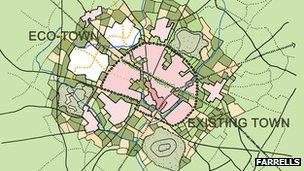Bicester 'eco-town' battle looming in 2012
- Published
For the company behind plans to build a 5,000-home "eco-town" in Oxfordshire, 2012 is likely to be a key year.
The project's biggest challenge to date is looming when the developers submit outline planning permission for the site in Bicester - likely to be during the summer.
They managed to get a smaller first phase with 393 homes approved in August, with building work set to start in the second quarter of 2012.
But the bulk of the scheme - which includes 1,500 affordable homes - will be unveiled to the public in the spring by P3Eco - a company set up by a consortium involved in funding and building "eco-towns".
The outline plans will go before Cherwell council, and will set out the scale and nature of the development.
English landscape
The idea is to get approval for the basic idea before substantial costs are incurred by drawing up detailed proposals.
The first phase of the development was met with opposition by some over its environmental credentials, and led to the Commission for Architecture and the Built Environment saying it had "little deviation from the standard suburban housing model".

Ian Inshaw, chairman of P3Eco, said the public will be kept informed
The criticism led to changes, including the layout of homes being altered so roofs with solar panels slope to the south and a reduction in car parking spaces.
Now the bigger plans are likely to cause more controversy in the town.
Campaigner Tony Ives said a consultation into the first phase was under-advertised, and said residents should have been allowed their views on whether they wanted an "eco-town" in the first place.
He said: "There are people who are very concerned. We are talking about a new town of 20,000 to 25,000 people here.
"Most people have not been made aware of the plan for the eco-town itself.
"It is all on green field land, green, grassy English landscape; we need to ask ourselves in this country why are we building housing on this type of land?
"Their [P3Eco's] idea of consultation is men in grey suits stood on a platform telling people what they are going to do. It should be a two-way process."
'Learnt lessons'
Bicester was one of a number of locations chosen by the previous Labour administration to become eco-towns in 2009, with promises of government money to help build infrastructure.

Bicester, with a current population of about 30,000, could see 5,000 new homes built in the town
The idea was to create zero-carbon developments, with 30% affordable housing and a minimum of 40% open space.
But following the General Election, the coalition withdrew funding for the scheme and allowed local authorities to decide if they wanted to continue with them if they had public support.
Ian Inshaw, chairman of P3Eco, said the plans would stick closely to the environmental aims of the project, and he had always welcomed views from the public.
He said: "We solved issues [with the first phase plan] and learnt lessons.
"It is always more challenging when you are starting something new. The demands that need to be met are quite stringent.
"[But] we value good input from people and want them to talk to us.
"I am sensing that the community is realising this is going to be a good thing for the town."
The Conservative-led Cherwell District Council said it still believed in the "eco-town" vision, but said it was "committed" to working with local communities and partners to ensure all voices are heard before any decision is made.
- Published12 August 2011
- Published9 June 2011
- Published21 April 2011
- Published17 March 2011